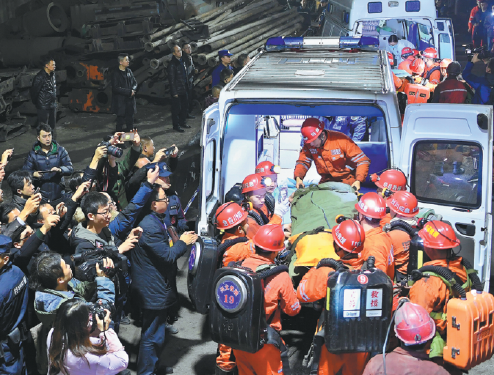13 miners rescued from flooded pit on fifth day
By Huang Zhiling in Yibin, Sichuan (CHINA DAILY) Updated: 2019-12-19 00:00At first there was only darkness and an enveloping silence underground, as a group of 13 coal miners found themselves cut off from the outside world by an accidental flood. They managed to move together to a spot of relative safety above the waterline. Then they waited.
That wait would last for more than 80 hours.
Fears alternately rose and subsided. The miners followed their training and experience to survive, hoping that someone would discover their whereabouts in the subterranean labyrinth of tunnels and get them out.
Five of their co-workers had already died.
The 13 men huddled in the flooded Shanmushu mine, which belongs to Sichuan Coal Industry Group, and faced the prospect that its tunnels might become their tomb.
Then came the faintest of sounds, representing a clarion of hope. A metallic noise reverberated faintly from a pipe in the blackness. It's a sound bound to stir instant joy to men trapped underground. Striking pipes is an old technique in mine rescues to connect rescuers and those awaiting rescue.
For the miners waiting uncertainly in the Shanmushu mine, the sound meant help was on the way.
The searchers had initially failed to find the miners, but a reciprocal hammering on pipes with metal bars signaled their presence.
"Finally there came the good news," said Zhou Zonghua, a miner who helped with the rescue. "All we wanted was for them to come back safe and sound."
After a rescue operation of more than 80 hours, the 13 miners returned to the outside world on Wednesday.
The Shanmushu mine, in the province's Gongxian county, administered by Yibin, had flooded at 3:26 pm on Saturday with 347 people working underground.
By Sunday morning, 329 of the workers had been brought to the surface. Five were confirmed dead and 13 remained trapped.
Rescuers managed to enter the tunnel at 9 am on Tuesday. Failing to find any of the 13 by 1 pm, they began striking steel pipes to alert them. They were delighted to hear people striking pipes in response.
At 2:57 am on Wednesday, Liu Guihua, 56, was able to walk to the rescuers after the water level in the shaft dropped some. He reported that the other 12 were alive, said Hu Xiaohua, an information officer for the Yibin city government.
The men were then located and extracted from the mine. For two hours, from about 6 am to 8 am, the 12 were lifted one by one out of the darkness and sent to hospitals in Yibin. All were in a weakened condition-they had not eaten for days. But they were stable, according to a Sichuan Coal Industry Group news release.
People in charge of the rescue cited several reasons for the 13 miners' survival. First, they were experienced and took turns turning on their head lamps. Light helped stave off panic. Also, they stayed together in a relatively high place that was unlikely to flood and that had plenty of air.
The temperature was 24 C in the shaft-warm enough to stave off hypothermia and rapid deterioration of their strength.

- 'Cooperation is complementary'
- Worldwide manhunt nets 50th fugitive
- China-Japan meet seeks cooperation
- Agency ensuring natural gas supply
- Global manhunt sees China catch its 50th fugitive
- Call for 'Red Boat Spirit' a noble goal, official says
- China 'open to world' of foreign talent
- Free trade studies agreed on as Li meets with Canadian PM Trudeau
- Emojis on austerity rules from top anti-graft authority go viral
- Xi: All aboard internet express











